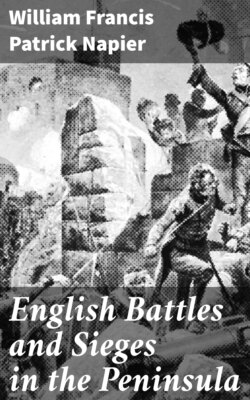Читать книгу English Battles and Sieges in the Peninsula - William Francis Patrick Napier - Страница 25
На сайте Литреса книга снята с продажи.
Combat of Foz d’Aronce. (March, 1811.)
ОглавлениеTable of Contents
Massena, fearing Cole would get in his rear, set fire to the town of Miranda, crossed the Ceira in the night, and being then crowded in a narrow way between the sierras and the Mondego, destroyed ammunition and baggage, and directed Ney to cover the movement with a few battalions, but charged him not to risk an action: Ney, however, little regarding his orders, kept the left bank with ten or twelve battalions, a brigade of cavalry and some guns, and thus provoked a combat. His right was on rugged ground, his left at the village of Foz d’Aronce; the weather was obscure and rainy, the allies did not come up until evening, and little expecting an action kindled their fires; but Wellington, suddenly directing the light division and Pack’s brigade to hold the French right in check, sent the third division against their left, and the horse-artillery on the gallop to rising ground, whence it opened with a surprising effect.
Ney’s left wing was soon overthrown by the third division, and fled in such confusion towards the river that many men rushed into the deeps and were drowned, while others madly crowding the bridge were crushed to death. On the other flank the ground was so rough the action resolved itself into a skirmish, and Ney sent some battalions to stop the pursuit of his left; but then darkness fell and the French troops in their disorder fired on each other. Four officers and sixty men fell on the side of the British; the enemy lost above five hundred, one half drowned, and an eagle was afterwards found in the bed of the river. Massena retired in the night behind the Alva. Ney kept his post on the Ceira until every encumbrance had passed, and then blowing up seventy feet of the bridge, remained with a weak rear-guard. Wellington halted.
Up to this point of the retreat the French prince had displayed infinite ability, with a ruthless spirit. The burning of some towns and villages protected his rear, but Leiria and the convent of Alcobaça were off the line yet given to the flames by express orders and in a spirit of vengeance. But every horror that could make war hideous attended this retreat. Distress, conflagrations, death, in all modes from wounds, from fatigue, from water, from the flames, from starvation! On all sides unlimited violence, unlimited vengeance. I myself saw a peasant hounding on his dog to devour the dead and dying, and the spirit of cruelty smote even the brute creation; for the French general, to lessen encumbrances, ordered beasts of burden to be destroyed, and the inhuman fellow charged with the execution hamstringed five hundred asses and left them to starve; they were so found by the British, and the mute, sad, deep expression of pain and grief visible in the poor creatures’ looks, excited a strange fury in the soldiers: no quarter would have been given at that time: humane feelings would have thus led direct to cruelty. But all passions are akin to madness.
From this quarter, Lord Wellington, who had before detached troops with the same view, now sent Cole’s division to join Beresford in the Alemtejo, where the latter had been left to oppose Soult’s progress.
